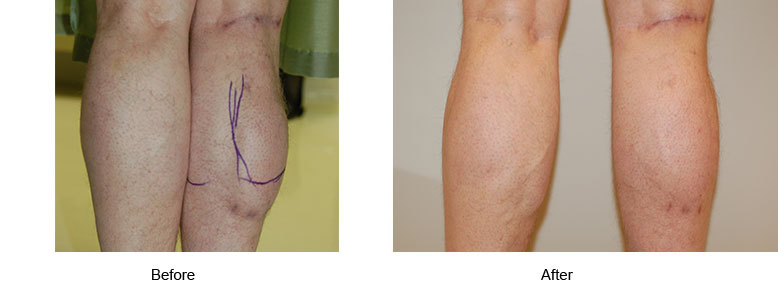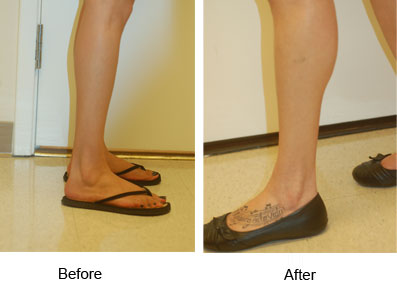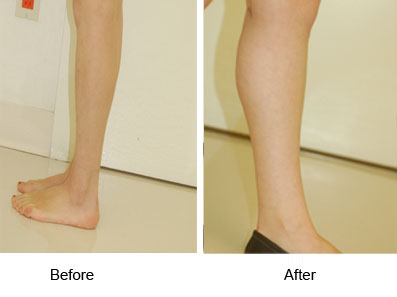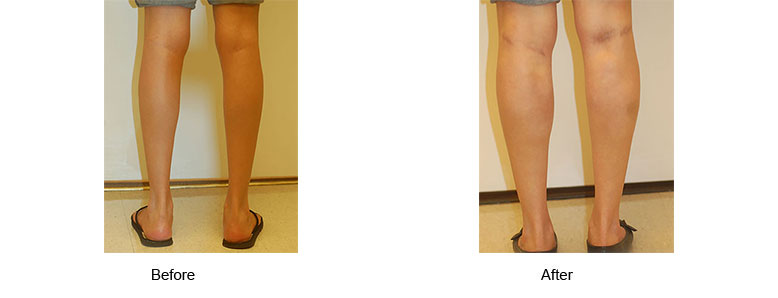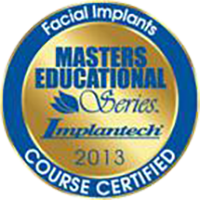Get a More Balanced Look with Dr. Javaheri
- About Calf Implant Surgery
- Before & After
- Are you a Candidate?
- About the Operation
- What to Expect During the Surgery
- Calf Implant Surgery: Procedure Explanation
- What to Expect After the Surgery
- Your Recovery
- Possible Complications
About Calf Implant Surgery
One of the best ways for people who struggle with asymmetrical lower limbs is by undergoing calf implant surgery. The surgical procedure is designed to improve the form of the calves through the surgical insertion of artificial implants.
Implants are used to add mass and definition to the calves, making individuals appear toner and well-built. Men and women go through the procedure for different reasons. Male patients normally opt for surgery to emphasize the bulk of their calf muscles, whereas females want to achieve a look where their lower legs look more proportional to their thighs.
Who performs calf implants? Those who have a congenital calf asymmetry, club feet, athletic male, and those males or females who desire a larger calf.
An implant with the actual shape of the calf muscle is placed under the calfskin, making the person’s stature balanced. Available in many sizes, the implant is purely made from solid silicone.
Although there have been many controversies on the use of silicone in plastic surgery, you have nothing to worry about on this. Unlike the liquid silicone commonly used in breast augmentation, the solid type has been deemed completely safe by scientists.
Before and After Calf Implant Surgery
*Individual results will vary in each patient.Why Choose Calf Implant Surgery?
Are you self-conscious about how your legs look? Have you always wanted to appear more confident with firmer, more defined lower legs?
If one of these applies to you, calf implant surgery sounds just about the perfect solution for you. The surgical procedure can be performed for both aesthetic and correction purposes.
Here are common reasons why people consider calf implant surgery for cosmetic enhancement:
- Men, especially bodybuilders, want to achieve a more defined bulk of the calf muscle.
- Women desire a lower leg that is proportionate to their thighs.
- Many wish to attain a more balanced figure.
- Many want to feel more confident about their appearance.
Are You a Calf Implant Surgery Candidate?
For people with irregularities on their lower leg, due to either an injury or disease, calf implant surgery is a surefire way to get their stature right. Those with poorly developed calves since birth are also ideal candidates for the surgery.
Men and women who want to enhance their appearance are also typical candidates for the surgery. People who have been working out heavily without seeing development on their leg muscles are also ideal for calf implant surgery.
As long as you are healthy and in good physical condition, you can certainly be a candidate.
What to Expect During Your Calf Implant Surgery Consultation
During your consultation with Dr. Javaheri, you will discuss with him your goals and expectations for the surgical treatment. Goals must be set realistically. You will go through a series of questions followed by an examination to see if you can be considered a candidate for calf implant surgery.
Certain questions regarding your medical history will be asked. Be sure to talk openly about your past and present medical conditions, past surgeries (if necessary), whether you have allergies, and what medications you are presently taking.
If you have a problematic medical condition, let him know as such factors can pose a risk during or after your calf implant surgery.
Once Dr. Javaheri has fully examined your legs and affirms that you are eligible for the surgery, he will explain the whole procedure, as well as what to expect after surgery. He will also talk about other important things such as the benefits, the treatment and recovery process, and the possible risks during and after you undergo calf implant surgery.
Calf Implant Surgery: Procedure Explanation
Before you have the surgery, you will have your legs measured. This is done to determine the appropriate size and shape of the implants needed to make the results appear natural. These implants are then ordered from the manufacturing company.
During your calf implant surgery, which usually takes only about an hour, you will be lying on your stomach the entire time. General anesthesia or sedation anesthesia is administered. Once the anesthesia is in effect, Dr. Javaheri starts to make incisions at the back of your knee.
A pocket is made large enough for the implant to fit in a secured position. Careful and thorough attention is given, as there is a possibility of bleeding during the surgery. The implant is then gradually inserted into the pocket, just above the calf muscle.
The other leg will also go through the same procedure. Once both legs have been filled with implants, Dr. Javaheri will double-check them and make sure they are well-proportioned. If the results are desirable and flawless, the final step of suturing will be made.
What to Expect After Your Calf Implant Surgery
It is common for patients to experience pain and discomfort right after undergoing calf implant surgery. Expect your calves to be sore, stiff, and swollen. Also, don’t be shocked to see bruises over the surface of the incision areas.
Dr. Javaheri will prescribe medications to alleviate your post-operative pain. Don’t worry, the pain will eventually subside in just a few days. After a week or two, you may resume your daily physical activities, although vigorous activities are prohibited for approximately six weeks.
You will also be given post-op instructions for faster healing and fewer chances of experiencing complications. Patients are usually advised not to walk excessively for several days immediately following the surgery.
Your Calf Implant Surgery Recovery Process
As with other post-surgical treatments, calf implant surgery does take a few weeks to recover. Dr. Javaheri will provide all the necessary patient care instructions that you need to follow, including what medications to take and what activities to restrict. You will also be oriented on the possible complications that you might encounter, as well as the normal symptoms brought about by the surgery.
The recovery process for calf implant surgery is divided into two areas: the short-term surgical recovery, which takes place during the first two weeks, and the long-term cosmetic recovery, usually lasting for up to eight weeks.
During the short-term surgical recovery, here are what to expect:
- Someone will assist you when you need to get up from a bed or chair.
- When lying down, your legs should be elevated to reduce discomfort and swelling.
- Once your dressings are removed, you will be instructed to walk around at a gradual pace.
- You will be walking stiffly during the first week.
The second phase of the recovery process begins once you go back to walking normally. The process can take five weeks until you can finally return to full physical activities.
- Your skin starts to stretch and eventually loses its “shiny” appearance.
- Bruises around the incision spots disappear.
- Normal activities resume in four to six weeks after your calf implant surgery. However, you are not allowed to do vigorous activities such as running, weightlifting, bicycling, swimming, or other sports that require a lot of movement.
- Full recovery depends on the person’s level of health. Patients usually go back to their normal routine, including exercise, in a span of one month.
Possible Calf Implant Surgery Complications
Just like any surgical procedure, there is a risk for potential complications from calf implant surgery, though only minimal. Complications may include allergic reactions, bleeding, and infection. Antibiotics are given to minimize the possibility of such risks.
In some instances, implants may shift and cause an irregular appearance. If this happens, additional surgery is required.
Outcomes vary depending on factors such as the anatomy and healing abilities of each individual. It is important that you understand the risks of calf implant surgery first before deciding to go through the operation. Always remember that consultation and medical examination must be completed before approval.
Schedule Your Calf Implant Surgery Consultation Today!
Are you ready to talk to Dr. Javaheri about your cosmetic goals? Do you still have questions regarding calf implant surgery that you want to clarify? Give us a call at 415-923-3800 today. Get that look that you have always wanted to achieve!



